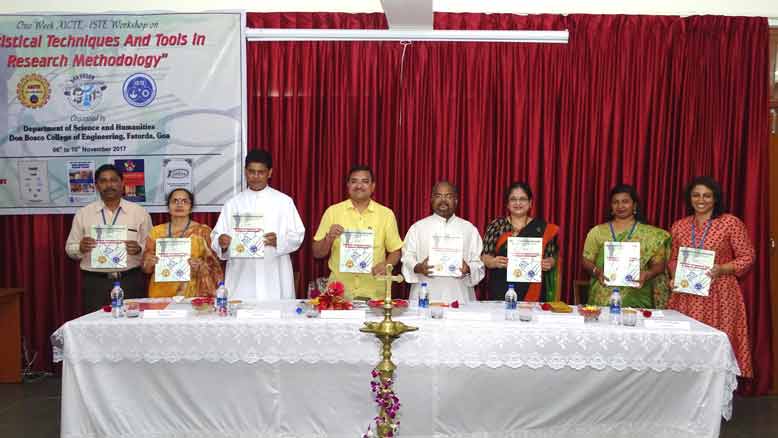AICTE- ISTE One week Workshop on Statistical Techniques and Tools in Research Methodology” on 6th – 10th November 2017

The Department of Science and Humanities, Don Bosco College of Engineering inaugurated the AICTE- ISTE One week Workshop on the theme: “Statistical Techniques and Tools in Research Methodology” on 6th November 2017 at the hands of Shri Sidharth Kuncalienker, Chairman EDC Goa. Speaking on the occasion, Shri Kuncalienker, elaborated the role of statistics in every aspect of life and more so in politics. He explained how every political and economic decision of the government is a result of statistical surveying and analysis. Earlier, the Director Fr Kinley D’Cruz and Principal Dr. Neena Panandikar welcomed the gathering and applauded the efforts of the department in taking such an initiative. Rector Fr. Paul D’Souza, Head of Department – Dr. Kala Nayak, and resource person Dr Parameshwar Pandit, Bangalore University were the other dignitaries present.
The convener of the workshop Prof Roseline Fernandes explained the significance of organising the workshop on statistics. The workshop was aimed at imparting to every professional and researcher the awareness and use of statistical tools to help draw rigorous and substantial conclusions to an experimental activity. The workshop had experts from various reputed institutions like Manipal Institute of Technology, Bangalore University, Christ University, Shivaji University, Goa University among others, who delivered the sessions. A souvenir was released on the occasion that was presented to all the participants. Prof. Natasha Jaques, co-convener delivered the vote of thanks. The workshop concluded on 10th November 2017.
The workshop on STTRM saw a whole range of varied topics and discussions on Statistics unfold during the course of these 5 days.
On day one of the workshop ,Dr. Pandit introduced the concepts of random variables and the probability distributions that they could possibly follow that help one calculate and quantify a chance factor for a given event.
The evening session included an introduction to the use of R-software demonstrated by Dr. Wagh. In the practical session he introduced and explained the various commands that could be used in the r-software .
Dr. Pandit continued his session with inferential statistics on Day 2, in which he explained parametric and nonparametric statistical inference and how an experimenter or a statistician can set up a suitable hypothesis which would have to be tested for acceptance or rejection for fixed level of significance.
The next session for the day was conducted by Dr. Pai who explained to the audience the various steps and methods carried out in testing of variation in samples.He elaborated on the one way and two way ANOVA classification method, taguchi method and then continued with Design of Experiments which was then practically solved in the laboratory session post lunch with the help of MINITAB.
Day 3 saw the participants involve themselves in the concepts of Operations Research delivered by Prof. Sanjai, who explained how to formulate a mathematical model in a Linear programming problem with objective function subject to suitable constraints. He further elaborated on the methods like, graphical, simplex methods that could be used to solve the mathematical model to obtain the optimum result. He further continued to explain the concepts that are dealt with in Non-linear programming and engaged the participants in a practical session to solve Linear programming problems and transportation problem with the help of an excel sheet.
Prof. Suraj Marathe began a session on statistical quality control on day 4 in which he explained the importance of quality and how one would need to control the chance and assigned causes that could disturb a sample. He explained elaborately on the concepts of Acceptance sampling, steps involved in Statistical Quality Control using variable and attribute charts and then explained that one could proceed into DOE as explained by Dr. Pai on Day 2.
Dr. Suraj Rane delivered a session on Reliability Engineering in which he explained the very basics of reliability, failure rate and the reliability of components and hence of a system in series and parallel. The participants were then made to analytically compute reliability, failure rate, mean time to failure and the reliability of a system.
The final day began with a lecture on Stochastic processes delivered by Dr. Sebastian Mesquita. He explained to the participants the concept of Random Processes and further discussed Markov, Counting and Poisson Processes. He also presented the Cramer Lumberg Model, Brownian Motion along with citing real life examples related to insurance, stock exchange and commodity exchange.
Dr. Shirke in his lecture on Regression Models explained to the participants the requirements of a regression model being assessing the relation between responses and regressors and later on predicting response for a given values of regressors. He further explained the need to address the errors in the regression model and the use of the Least Square Method. The participants were explained to regarding Linear Regression, Multiple regression and Logistic Regression. As an example of Logistic Regression he explained Artificial Neural Network and Regression Trees.
The workshop ended with a valedictory function graced by Dr. D.T. Shirke, Pro-Vice- Chancellor , Shivaji University who congratulated the organisers for having conducted the workshop.
Rev. Fr. Kinley D’cruz appreciated the organizing team for their effort and handed over appreciation letters to the committee.
The 5 day report of the sessions during the workshop was read by Prof. Natasha D’souza e Jaques and Prof. Roseline Fernandes delivered the vote of thanks.













 Visit Today : 602
Visit Today : 602